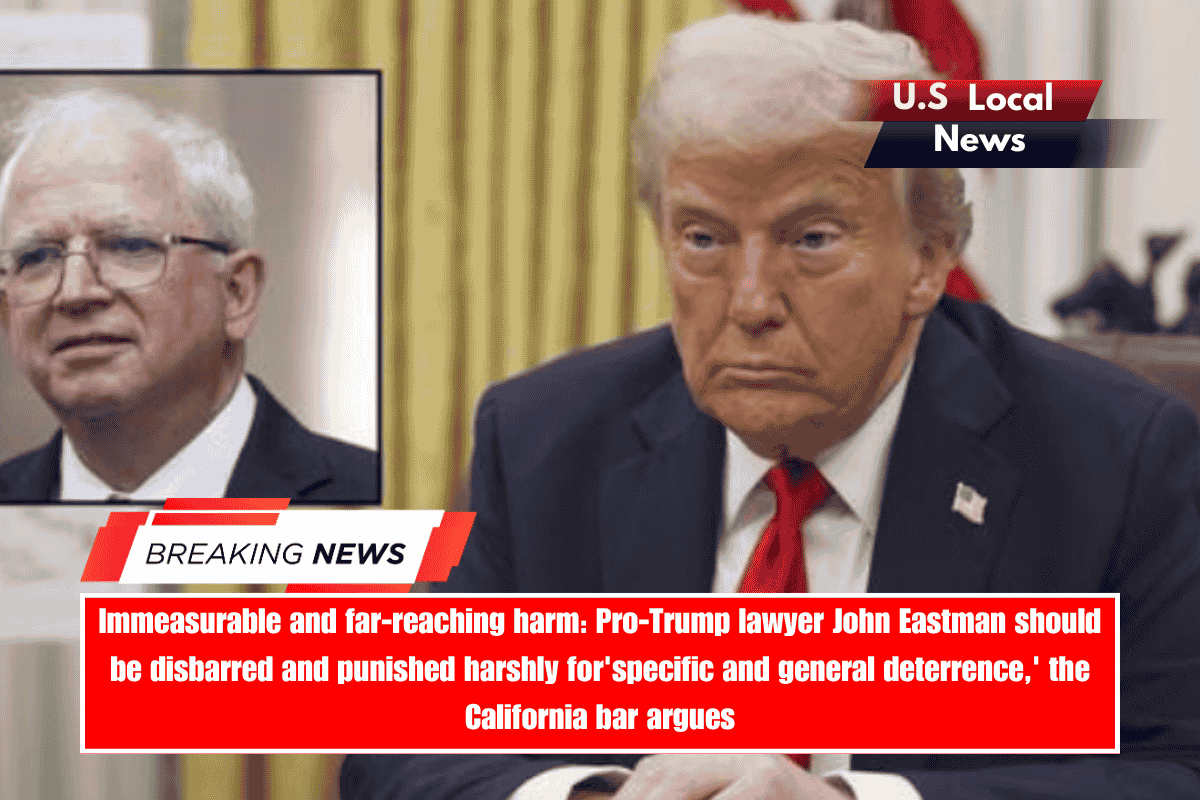The State Bar of California has petitioned the California Supreme Court to uphold a disbarment recommendation for former law professor John Eastman for his role in efforts to overturn the 2020 presidential election results in favor of President Donald Trump.
On Monday, bar attorneys filed a 34-page petition with the California Supreme Court, requesting a ruling on certain issues concerning the standard of review. The petition also asks the justices to agree that Eastman’s law license should be revoked for his pro-Trump legal work.
“Eastman made myriad knowing misrepresentations—in written memoranda, in court filings, in media, and in person—falsely alleging that the 2020 presidential election had been stolen through election fraud and illegalities,” the petition’s title states. “After losing arguments in the courts, with election officials, and with state legislatures, Eastman concocted the theory that the Vice President, as president of the Senate, could reject or delay the count of the legally valid, state certified electors from the seven swing states.”
In June, a three-judge panel on the California State Bar Court’s Review Department — effectively a court of appeals in California’s extensive, multi-tiered system for lawyer discipline — agreed with a March 2024 decision recommending Eastman’s disbarment.
However, the intermediate court took a step with which the bar’s disciplinary counsel disagreed. In its most recent decision, the appeals court identified “strict scrutiny” as the framework for evaluating Eastman’s statements and legal work regarding Trump.
According to long-standing constitutional analysis principles, how a court approaches an inquiry into government behavior is frequently determinative, if not dispositive. The US Supreme Court distinguishes three major frameworks: rational basis review, intermediate scrutiny, and strict scrutiny. In general, rational basis review often results in a victory for the government; strict scrutiny frequently results in a loss; and intermediate scrutiny is anyone’s guess.
In Eastman’s case, the bar’s counsel is a member of the bar, which is a component of the court system, all of which were established by the legislature. In essence, when analyzing the punishment for Eastman’s speech, the counsel’s behavior is coded as governmental action.
The reviewing court determined that “all of Eastman’s relevant statements were core political speech triggering strict scrutiny,” according to the state bar’s filing. However, the state bar believes this is an incorrect interpretation of what Eastman said and did.
“The United States Supreme Court, the Ninth Circuit, and the State Bar Court have all recognized that when lawyers speak in their professional capacity, including in particular when engaging in client advocacy that relates to a pending case, regulation of their statements may be subject to the more deferential intermediate scrutiny that balances the attorney’s speech rights against the state’s regulatory and public protection interests,” according to the filing. “Here, the statements at issue were made by Eastman, acting in his professional capacity while engaging in advocacy on behalf of a client, then-candidate Trump, including in relation to pending cases.”
Notably, the appellate court rejected Eastman’s First Amendment arguments, ultimately finding the attorney’s statements to be false, misleading, and in support of illegal activity.
But, the state bar says, getting the standard of review correct is still important because they want Eastman’s case to stand as “as future citable authority” and believe the “identification of strict scrutiny as the standard applicable” to Eastman’s pro-Trump efforts “stands in stark contrast to extensive jurisprudence to the contrary.”
The state bar has also asked the high court to clarify whether Eastman’s misconduct constituted “significant harm in aggravation.”
Again, both the trial and appellate courts disagreed, declining to find that Eastman’s actions harmed “the public, the courts, and the legal profession.” However, the disciplinary counsel claimed that Eastman caused additional harm to election administrators by “sowing doubt” about the electoral process.
“Eastman’s repeated and intentional promulgation of statements he knew to be false and legal theories he knew to be baseless had tangible, devastating consequences for public confidence in the integrity of our democratic institutions, the orderly administration of justice, and the safety of those charged with carrying out the lawful certification of a presidential election,” the petition’s title says. “There is no doubt that Eastman’s misconduct caused immeasurable and far-reaching harm and disrepute to the profession, the public, and democracy itself, and significant aggravation should have been assigned for these harms.”
The Monday filing is optional. Following the Review Department’s decision, the case was automatically filed with the California Supreme Court, allowing each party 60 days to file a petition.
If neither party had filed such a petition, the intermediate ruling would have been final. Eastman, for his part, asked the state supreme court for more time to file and was granted a reprieve. He has until September 29 to file his own petition.
Eastman was a key architect of Trump’s efforts to overturn the 2020 election results, having infamously authored two of many so-called “coup memos.” These memos provided various scenarios in which Joe Biden’s electoral college victory could be overturned.
At its core, the state bar’s filing poses little risk in Eastman’s case – because the reviewing court still recommended disbarment – but seeks to reclaim the ability to impose harsher discipline on future attorneys.
“Eastman’s actions constituted unprecedented misconduct of the most egregious nature and the harm he caused should be recognized and included in the disciplinary analysis to stand as specific and general deterrence for Eastman and other lawyers,” according to the petition.









